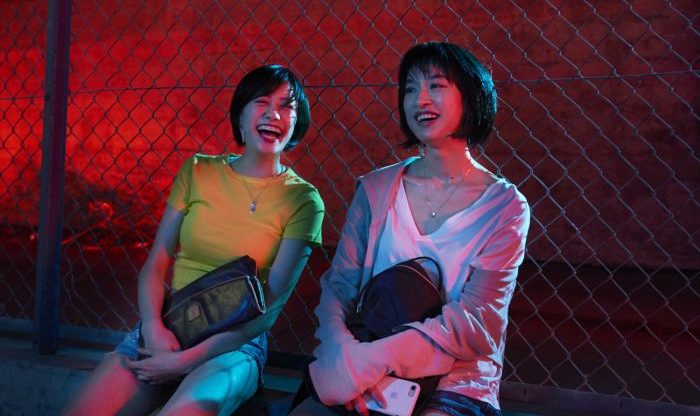Director: Ken Ninomiya
Fantasia International Film Festival 2019 review
From its hyper-saturated colour scheme to its EDM-fuelled montages, Chiwawa owes a clear debt to 2012’s Spring Breakers – one that director Ken Ninomiya seems to openly acknowledge with a few all too familiar shots. But where Harmony Korine’s hedonistic opus surrendered wholeheartedly to the woozy rush of the night, Chiwawa complicates its pleasure-seeking with a more pronounced moral conscience, before journeying beyond the debauchery to observe what happens after the high burns out. Call it Spring Breakers with hindsight then, though Ninomiya’s intoxicated drama could hardly be mistaken for an after-school special on the dangers of drugs and promiscuity.
Chiwawa’s concern with the consequences of living like there’s no tomorrow is signified in its opening seconds, when narrator Miki (Mugi Kadowaki) breaks the news that 20-year-old nursing student Yoshiko Chiwaki (Shiori Yoshida) was found dead and dismembered last month. Miki admits that it took her a while to realise that the victim was none other than her friend Chiwawa, who adopted a quirky nickname and a ditzy party persona for all social occasions.
There’s a dark irony to the suggestion that Chiwawa’s body was found in pieces, in that her tumultuous life is presented as similarly fragmentary. The bubbly young Instagram model lived to be seen, and so her existence is divided across the perceptions and memories of others. It’s only when Miki questions her friends on their personal recollections of Chiwawa that we start to get a fuller picture of who she really was, though even then, the late social media celeb maintains a beguiling sense of mystery.
The Spring Breakers comparison seems especially apt for the film’s first few minutes, in which Chiwawa impulsively steals some money to fund a holiday for Miki’s social circle. What follows is a dazzling and euphoric sequence of candy-coloured revelry, as the gang burns through the budget in three days of excess. The trip ends on a note of melancholy, however, as Chiwawa and her boyfriend Yoshida (Ryô Narita) pair off with separate partners, paving the way for the sobering comedown to follow.

From here, Chiwawa’s existence becomes increasingly rootless as she bounces between various friends’ homes before finally taking gigs in the porn industry. A darkly comic highlight arrives in the form of a tightly wound montage that takes us through her orgy-centric daily routine in a manner that’s unnervingly mechanised and ultimately draining.
Chiwawa’s final days are interwoven with the weeks following her death, when her story becomes the subject of sensationalistic media coverage and her murder goes undigested by those who barely knew her. Her social media stardom and superficial public persona leave behind only a fleeting impression, as the news cycle moves on to new tragedies and her friends progress to the next phases in their lives.
Nonetheless, while much of Chiwawa is characterised by a haunting feeling of emptiness and regret, the film’s mournful closing minutes offer a conclusion of surprising warmth and sincerity, earning the emotional catharsis that Miki spends the whole movie struggling to find.
Though Ninomiya clearly has much to say about the pitfalls of living fast in the age of Instagram, it’s to the director’s credit that his feature can never be reduced to a mere cautionary tale. Instead, Chiwawa seeks to move beyond the agenda-driven narratives of contemporary youth culture and find the humanity that persists beneath all the noise. In the title character’s case, this humanity is felt as only a distant echo, and yet, through the memories and grief of those she met, we find hope that modern day connections needn’t be as cynical and hollow as they can sometimes seem.





